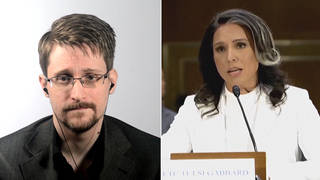
The Obama administration has declassified part of its plan to bolster cyber security, which calls for greater cooperation between private companies and the National Security Agency. Privacy and civil liberties advocates have sounded alarms about the NSA’s expanded role in security because of the secretive nature of the agency and its role in the Bush administration’s warrantless wiretapping program. [includes rush transcript]
Transcript
JUAN GONZALEZ:
The Obama administration has declassified part of a plan to bolster cyber security. The initiative calls for greater cooperation between private companies and the National Security Agency.
Privacy and civil liberties advocates have sounded alarms about the NSA’s expanded role in security because of the secretive nature of the agency and its role in the Bush administration’s warrantless wiretapping program. The declassified summary of the initiative says the Department of Homeland Security will run a new security system called Einstein 3 that will look inside email and other data into and out of the federal networks.
AMY GOODMAN:
The news follows last month’s announcement that Google was teaming up with the NSA, the National Security Agency, to investigate a cyber attack on the internet search giant. The agreement between Google and the NSA would reportedly be the first time Google entered into such a formal information-sharing relationship.
The Electronic Privacy Information Center filed a Freedom of Information Act request shortly afterward, seeking more information about the deal. EPIC also filed a lawsuit against the NSA and the National Security Council, seeking a key document governing the government’s broader national cyber security policy, which has been shrouded in secrecy.
Lillie Coney is the associate director of the Electronic Privacy Information Center, joining us from Washington, DC.
Welcome to Democracy Now! What have you found in these documents, Lillie?
LILLIE CONEY:
The documents we’re seeking, we haven’t gotten the reply back from the agency, but I can talk to you about why we’re seeking the information. The National Security Directive, Presidential Directive 54, is the foundational document regarding the nation’s national security — cyber security strategy. We are seeking that document in order to gain better insight into some of the programs that have been outlined, like the Einstein 3 initiative, which is still shrouded in secrecy. We have seen Einstein 1, the Einstein 1 document and the Einstein 2 document, but the Einstein 3 is still not available. It’s important to understand how these programs will be managed, what their goals and objectives are, and how they might implicate or impact the privacy rights of those who are online.
JUAN GONZALEZ:
And what were Einstein 1 and 2?
LILLIE CONEY:
They were documents that were drafted about the non — well, the civilian government network, so if you’re looking at the Department of Education website or you’re looking at the Department of Agriculture’s website and a number of other agencies that are considered to be federal government civilian agencies, if visiting those sites, the objective was to protect government networks from cyber attacks or anything that might prevent those sites from being up and available and running. So anyone visiting those sites would be monitored, screened, or a series of ways to identify whether the person is engaging in some activity that may pose a threat to these websites, sort of like building a fence around government agency websites and then checking who goes in and who goes out, which is something very different from the way the internet has worked in the past.
AMY GOODMAN:
Lillie Coney, your organization and Ralph Nader wrote a letter to President Obama about deploying full-body scanning devices at the nation’s airports. What’s your concern?
LILLIE CONEY:
Whole-body imaging technology is a whole new way to screen individuals. What we’re looking at with these technologies is that it can — the way they work, they can penetrate the outer layers of clothing and take a very detailed image of what someone looks like without their clothing. These technologies are not regulated. The privacy policies that are put in place are at the discretion of the agency, which in fact the agency could change at their own discretion at any time.
So what we’re looking at are three things: one, looking at whether these — how the decision to reach regarding purchasing these systems, what the rationale was for trying to use that as a primary screening device, instead of what was initially announced by the agency, that it would only be used for secondary screening; and then the health issues that may be a part of using these systems on the general population; and then the third thing, establishing privacy protections that are not governed by the agency but are built in, from the beginning of the process to the end, that create transparency, oversight and accountability over the information that this agency might collect as it relates to the use of whole-body imaging.
AMY GOODMAN:
Lillie Coney, we want to thank you for being with us. We know the latest news, two Muslim women trying to leave Manchester Airport for Pakistan in February refused to go through these body scanners, saying they didn’t want their — what they didn’t want — she objected on religious grounds, saying they didn’t want these guards looking under their clothes, and they were denied entrance onto the plane. Lillie Coney is associate director of the Electronic Privacy Information Center.












Media Options